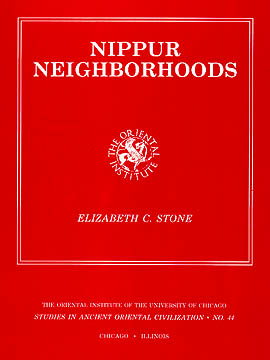SAOC 44. Nippur Neighborhoods. E. C. Stone.

The two neighborhoods, TA (in areal extent only 20 m x 40 m) and TB (apparently about the same size), only 30-40 m distant, offer significant contrast in organization. TA consists basically of unplanned domestic architecture which accumulated over six generations (which are more fully documented in Stone's important article in Iraq 43 [1981] 19-33). Stone first correlates the information in the texts found in these houses, which provide the details of inheritance procedures and house sales, with architectural modifications. She speculates, based on an explicit analogy with British mandate records, that a rural lineage was co-opted by royal powers (p. 72) and settled in Nippur. Through time, lineage members became attached to temple organizations in Nippur, receiving real estate and benefices; finally, immigrants not connected to the neighborhood developed ties with the TA lineage. The TB neighborhood, on the other hand, consisted of well-planned residential quarters of landless temple administrators. These houses were not owned by their occupants, since the texts found in them do not concern inheritances and sales but only various rentals and loans. Some of the structures "hint at enterprises of a commercial nature" (p. 89) - for example, a bakery. The administrators living in TB became wealthy through the buying and selling of temple offices. The chapters following Stone's reconstructions, house by house, of these two neighborhoods include descriptions of the artifacts and general conclusions. Then follow lengthy appendices of object catalogs, text copies and lists of personal names found in the texts, and plates of architectural plans. [From a review by Norman Yoffee in the American Anthropologist 91 (1989) 786-87].
- Studies in Ancient Oriental Civilization 44
- Chicago: The Oriental Institute, 1987
- ISBN 0-918986-50-8
- Pp. xviii + 294, 7 figures, 94 plates, 24 tables
- Paperbound 9 x 11.75 in / 23 x 30 cm
- Out of Print

